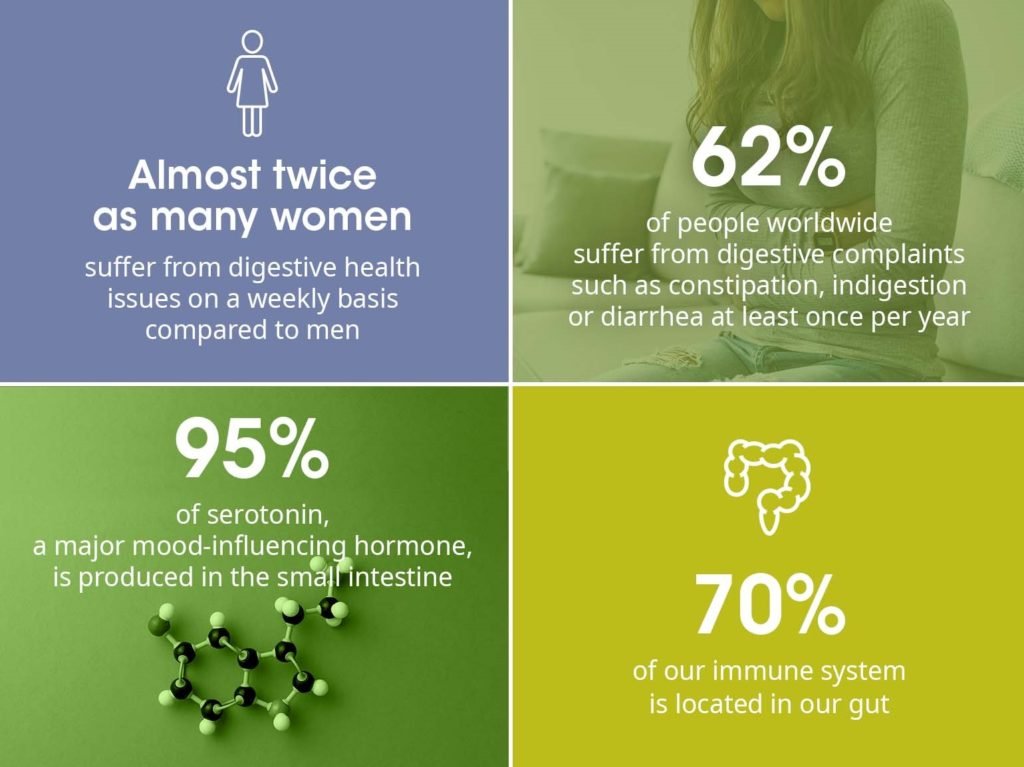Your cart is currently empty!

Facts
- Our gut is made up of trillions of bacteria – some friendly and others not so friendly
- Research shows that having a healthy gut
- Improves immune function
- Improves digestion
- Reduces inflammation and risk of diseases like diabetes, cardiovascular disease, and cancer
- Decreases anxiety, and even improves brain function and mood
- Understanding how our gut works – to regulate our hormones, our mood and our immune system – can help us develop daily strategies to take better care of ourselves
- Increasing intake of fruit and vegetables, and pre- and probiotics all contributing to ensure optimal gut health
Gut health and microbiota
I’m sure you’ve heard of products containing probiotics (e.g., yoghurt), prebiotics (e.g., plant-based foods), fermented foods, gut microbiota (microorganisms including bacteria, virus and fungi that reside in the gut) and microbiome (genetic makeup of these microorganisms) and gut bacteria.
This is because having a healthy gut is essential to your health and well-being.
Research has shown that a healthy gut microbiome has amazing health benefits, beyond just helping with digestion.
Good gut bacteria improve heart health, reduces the risk of colon cancer, and can even improve your sleep pattern and mood by producing feel-good hormones or neurotransmitters, like serotonin.
In fact, 95% of serotonin, is not produced in the brain but in the stomach.
This powerful example of the gut-brain connection demonstrates how gut health is linked to our emotions.
But the process works both ways with signals from the brain also effecting our gut.
The gut-brain relationship is currently gaining a lot of attention in the media and a hot topic for research.
While the gut-brain axis and its connections develop during the first three years of life.
Environmental factors like diet, medication, and lifestyle choices have a great influence as the child grows up.
Especially in the context of mood, anxiety, and depression.

What is the microbiome and gut diversity?
More than 100 trillion bacteria live in our gut — some are more friendly than others.
Together with other microorganisms (virus and fungi) – these make up the gut microbiome.
Maintaining the right balance of friendly and unfriendly bacteria in your gut can reduce inflammation and lower disease risk including diabetes.
It can also decrease anxiety, and even improve brain function.
A healthy balance of gut bacteria is also said to boost metabolism, eliminate cravings, and help you shed unwanted weight.
Importantly, 70% of the cells that make up your immune system reside in your gut. An imbalance of friendly and unfriendly bacteria in the gut or reduced “gut diversity” is associated with a reduced immune response as well as obesity, heart-, kidney- and liver-related diseases, cancer and autism.
How do gut microbiota affect metabolism?
Recent advances in research show that metabolic pathways in host (us) and microbes share similarities.
Within the gut, bacteria produce many products that act as key components in regulating metabolism in a range of cells throughout the body.
These cell types have important roles in regulating key metabolic processes like insulin sensitivity, glucose tolerance, fat storage, and appetite.
Fecal microbiota transplantation is a method that has been looked at for the treatment of some human diseases like obesity-associated metabolic disorders.
This method involves increasing gut microbial diversity by taking bacteria from healthy individuals and transferring then via transplantation into metabolically unhealthy individuals (eg. those with obesity or diabetes).
Short-term results are reported but further long-term studies are required.
What are probiotics?
Probiotics are “live microorganisms that, when administered in adequate amounts, confer a health benefit on the host”.
Diet is a powerful modulator of gut health and diversity of gut microbes. o
Vegan and vegetarians have greater gut diversity and provide high amounts of probiotics than those consuming more meat-based diet.
These can improve gut function and reduce symptoms associated with chronic disease like IBD.
What role do prebiotics and probiotics play in improving gut health?
Prebiotics refer to a group of nutrients that bacteria in the gut can breakdown and use to provide energy.
Prebiotics are typically derived from otherwise indigestible dietary materials like resistant starch and dietary fibres found in fruit and vegetables.
They feed the gut microbiota, and their broken-down products are short-chain fatty acids (SCFAs).
SCFAs are released into blood circulation, consequently, affecting not only the cells and function of the gut but also other distant organs.
SCFAs are used in many metabolic processes by cells of the gut and strengthen the gut function.
Other functions include supporting immune system.
In chronic diseases like Inflammatory Bowel Disease (IBD) and Colitis, SCFA production is impaired, thereby restricting energy supply to important cells of the gut.
This also contributes to inflammation of the gut lining.
In addition to SCFAs, production of other important nutrients like vitamins (e.g. vitamin K, vitamin B12 and folic acid) and amino acids, which humans are unable to produce themselves are also generated.
Adjusting the microbiota using prebiotics or probiotics can increase SCFAs producing bacteria and enrich microbiome diversity.
Take-home message
- The gut plays a critical role in your overall health.
- Incorporate more foods naturally high in prebiotics and probiotics into your diet.
- If you have IBS consider a low FODMAP diet and try incorporating a pre and probiotic. However, individual results may vary and side effects of abdominal pain, bloating and flatulence and diarrhea may be experienced.
- Foods naturally high in probiotics include yoghurt, kefir, sauerkraut, pickles, miso, tempeh, kimchi, sourdough bread and some cheeses.
- Foods naturally high in prebiotics include:
| Vegetables | Jerusalem artichokes, chicory, garlic, onion, leek, shallots, spring onion, asparagus, beetroot, fennel bulb, green peas, snow peas, sweetcorn, savoy cabbage |
| Legumes | Chickpeas, lentils, red kidney beans, baked beans, soybeans |
| Fruit | Custard apples, nectarines, white peaches, persimmon, tamarillo, watermelon, rambutan, grapefruit, pomegranate. Dried fruit (e.g., dates, figs) |
| Bread / cereals / snacks | Barley, rye bread, rye crackers, pasta, gnocchi, couscous, wheat bran, wheat bread, oats |
| Nuts and seeds | Cashews, pistachio nuts |
| Other | Human breast milk |




